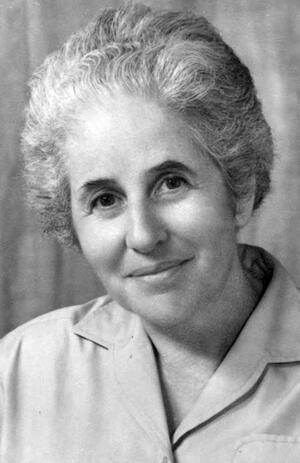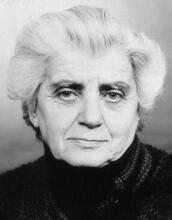Shulamith Nardi
Born and raised in New York City, Shulamith Nardi studied English literature at Barnard College and Columbia University while working for Hadassah. In 1934 she and her husband made aliyah to Tel Aviv, where she taught high school English while writing articles for the Jewish Frontier. She returned to the U.S. in 1939 and served as editor of the Hadassah Newsletter. She also found work writing and translating materials in support of the new state of Israel. Back in Israel, she began teaching at Hebrew University in 1953, focusing on contemporary Jewish literature in English-speaking countries. She became known for her translations of literature, poetry, and the Dead Sea Scrolls. She was appointed a presidential advisor on Diaspora affairs in the 1960s, a role she held until 1995.
Early Life
Shulamith Schwartz Nardi was born in New York on April 23, 1909, to Avraham Shmuel Schwartz (1876–1957), a physician and Hebrew poet who immigrated to the United States from Lithuania in the early 1900s, and Fanny (Fruma Gitel) Masliansky (1884–1979), daughter of the Reverend Zvi Hirsch Masliansky (1856–1943), known as Ha-Matif ha-Le’ummi (the National Preacher), a leading member of the Lit. "love of Zion." Movement whose aim was national renaissance of Jews and their return to Erez Israel. Began in Russia in 1882 in response to the pogroms of the previous year. Led to the formation of Bilu, the first modern aliyah movement.Hibbat Zion movement, who later became vice president of the Zionist Organization of America. She was educated in the public school system and tutored privately in Hebrew and Judaism. Shulamith had two brothers: Isaac (1912–1999) and David (1918–2002).
In 1924, at the age of fifteen, she completed high school and began attending Barnard College, where she majored in English literature. She completed her studies in 1928 and continued for a masters’ degree at Columbia University, subsequently starting post-graduate research on the influence of the Bible on Shakespeare’s works. At the same time, she continued her Zionist public activity within the framework of the Hadassah Women’s Zionist Organization, and eventually served as president of Junior Hadassah from 1931 to 1933.
Making Aliyah and Maintaining Ties to America
In 1933 she married Noah Nardi of Kiev (1900–1978), a Third Lit. "ascent." A "calling up" to the Torah during its reading in the synagogue.Aliyah (1919–1923) pioneer and a graduate of the David Yellin Teachers’ Seminary in Jerusalem, who came to the United States for advanced studies in education at Columbia University. One year later, the couple came to Palestine and settled in Tel Aviv. Dr. Noah Nardi joined the Labor School System and Shulamith taught English at the Herzlia Hebrew Gymnasia (high school) and wrote articles for The Jewish Frontier in the United States. On their way back from a vacation in the United States, they attended the Twentieth Zionist Congress in Zurich (August 3–16, l937), in which Shulamith participated as a delegate representing Hadassah. In 1938, their first child, Eran, was born in Tel Aviv.
In 1939 Shulamith was sent to the United States on behalf of the Jewish National Fund. The family’s stay there was extended until 1951 because of the outbreak of World War II and it was there that her two daughters were born, Meira in 1942 and Zvia in 1946. She continued her Zionist activity during this period as editor of the Hadassah Newsletter until 1943 and then joined the staff of the American Zionist Emergency Council, an organization which strove to rally American public opinion and ultimately also the United States administration in favor of the establishment of a Jewish State. Her activities included forging ties with groups of Lebanese Christian emigrants (Maronites and Malachites), in the hope of establishing cooperation among the various minorities in the Middle East. During that same period, Shulamith began learning Arabic with a Lebanese-American friend.
An Academic and Political Career
In 1951 Shulamith returned to Israel with her family and settled in Jerusalem. Her first job in Israel was that of liaison between the Israel Government and the U.S. Administration for the Grant-in-Aid Program. In 1953, however, she joined the staff of the Hebrew University of Jerusalem as an English instructor, first teaching English as a foreign language (in the basic studies program) and later as a member of the English Department faculty. At the same time, she worked as a volunteer for the newly established Israel Oriental Society, Hadassah, and other organizations.
In 1959 the Institute of Contemporary Jewry was established at the Hebrew University and Shulamith Nardi was one of its first faculty members. The founder and first director of this inter-disciplinary institute, Professor Moshe Davis, encouraged her to develop the study of contemporary Jewish literature in English-speaking countries, which was to become the focus of her future academic work.
In 1962–1963 she was a member of the Israel delegation to the United Nations General Assembly, representing the country on its Third Committee.
Shulamith embarked on a new career when Zalman Shazar, Third President of Israel, asked her to join his staff as an advisor on Lit. (Greek) "dispersion." The Jewish community, and its areas of residence, outside Erez Israel.Diaspora affairs (a function that also included international and interfaith relations). She occupied this position in the service of four Presidents—Zalman Shazar, Ephraim Katzir, Yitzhak Navon, and Chaim Herzog—until 1995, long after she had reached official retirement age.
An accomplished English editor and Hebrew-English translator, Shulamith Nardi made a substantial contribution in all the many fields of her interest; her achievements were extensive and varied. She played a decisive role in preparing basic texts for the American Zionist Emergency Council (such as those of Walter Lowdermilk, Bartley Crum, and Jorge Garcia-Granados), assisted in publishing material for the Institute of Contemporary Jewry, and translated the works of Zalman Shazar, as well as essays, literature, and poetry. In this respect, her translation of the Genesis Apocryphon, one of the Dead Sea Scrolls, may be considered her crowning achievement.
Shulamith Nardi died on May 3, 2002, having lived a long, full, and active life.
Selected Works
Avigadi, Nahman and Yigael Yadin. A Genesis Apocryphon: A scroll from the wilderness of Judaea. Translated by Shulamith Nardi. Jerusalem: Magnes Press of the Hebrew University, 1956.
Maimon, Ada. Women Build a Land. Translated by Shulamith Nardi. New York: Herzl Press, 1962.
The Shrine of the Book and its Scrolls. Jerusalem: The Israel Museum, 1965.




